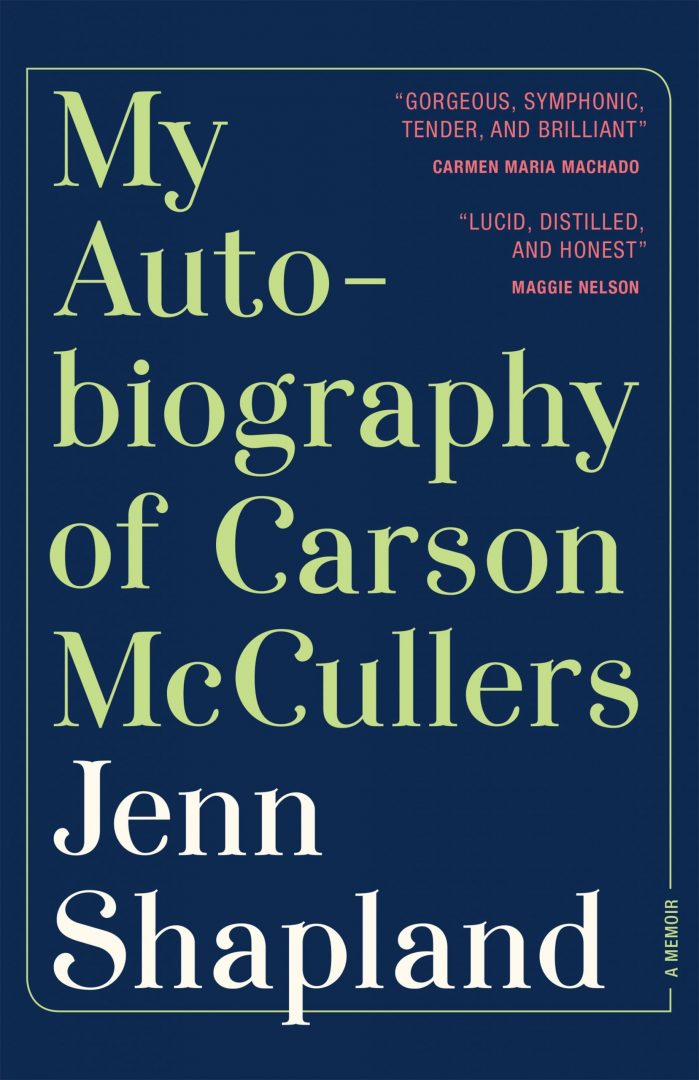My Autobiography of Carson McCullers by Jenn Shapland

Author: Sarah Neilson
February 5, 2020
Jenn Shapland was a lonely intern at the Harry Ransom Center, an archive of many famous writers’ and artists’ papers and books at the Austin campus of the University of Texas, when she first learned that Carson McCullers was queer. Her role at the Ransom Center was to field inquiries from researchers, most of whom were looking for archival material about David Foster Wallace or Norman Mailer. She had never read a McCullers book, but writes, “[her] book titles had always struck a chord with me. The Heart is a Lonely Hunter. Like, same.” One day, Shapland received an inquiry about correspondence between McCullers and Swiss writer and another woman: photographer Annemarie Clarac-Schwarzenbach.
“I found the letters at the tail end of the major, slow-burning catastrophe of my twenties,” Shapland writes. “Never quite breaking up with my first love… after six closeted years together. In my second year of a six-year PhD program, I was already bored sick of academia… I could tell I wasn’t cut out to be an archivist. I didn’t have the patience, and I spent too much time trying to solve mysteries of my own creation.” But upon pulling out folder 29.1 and reading the intimate letters between McCullers and Clarac-Schwarzenbach, Shapland found herself besotted. And a multi-layered mystery bloomed.
What archives are, who gets to have them, and whose stories (and what parts) get told are the central questions of My Autobiography of Carson McCullers. The book not only explores archives and the nature of archives, but is one in itself. Shapland crafts a biography/autobiography/queer theory hybrid out of her own story as a woman coming to terms with her queerness, with her identity as a writer, and with her chronic illness–three things she shared with McCullers.
Shapland follows the tributary of McCullers and Clarac-Schwarzenbach’s correspondence to the flowing river of archival material that exists around McCullers. After all, McCullers was white, a successful writer, and constantly in the company of other well-to-do people of the time: her on-again off-again husband Reeves McCullers, her best friend Tennessee Williams, the vast network of artists and writers at her beloved Yaddo. She was therefore in a position to produce and accumulate archives, something far too many queer, trans, Black and Brown, and disabled people were not. And still, in biographies of McCullers, her queerness is either ignored or brushed aside. This makes it all the more surprising, initially, to Shapland when she finds so much clear evidence of McCullers’ queerness–not only love letters between McCullers and other women, but therapy transcripts in which she openly struggles with not understanding her identity and emotions (she also had an intimate relationship with her therapist, Dr. Mary Mercer); photographs in which she wears masculine clothing; even her novels themselves, which, when one reads closely–that is, like a queer person–brim with queerness. Shapland becomes intimately familiar, even obsessed with, the evidence she finds–not only of queerness, but of a complex and utterly engrossing life. This obsession with a figure who feels like a kindred spirit will be recognizable to any queer person; we chase each other’s stories, hungry for them, dying to make them visible.
Shapland travels this river, following it to McCullers’ childhood home, where she takes up residence herself for a time; to Yaddo, where she serendipitously gets accepted off of the waitlist for a residency. She also follows it into and through her own body. The corporeal and ethereal aspects of both chronic illness and queerness are twined together: “When I am a body in pain, I have only self to turn to,” Shapland writes. “Illness is both culturally constructed and subjective. It is both within and without, felt in our bodies but filtered by the faulty language we have been given to describe it.”
Ultimately, My Autobiography of Carson McCullers is an exquisitely rendered map of discovery–of an icon, and of a self. It asks, with humor and tenderness, who gets to tell the story of their life? How do we understand each other’s stories? And is everyone queer? (Answer: yes).
My Autobiography of Carson McCullers
By Jenn Shapland
Tin House
Hardcover, 9781947793286, 240 pp.
February 2020

